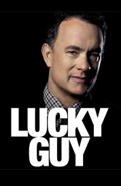10 Things to Know About Mike McAlary, the Tabloid Sensation Played by Tom Hanks in Lucky Guy
You’ve read all about Tom Hanks’ Broadway debut in Nora Ephron’s Lucky Guy, but how much do you really know about the man behind the drama? Pulitzer Prize-winning columnist Mike McAlary was, for a time, a national sensation, and one of the most notorious reporters during the New York tabloid wars of the late ‘80s and early ‘90s. He blew the whistle on crooked cops and gang leaders, even as he battled cancer and raised four children. Here are 10 must-know facts about the legendary journalist whose voice will echo across Broadway this season.
1. He made a name for himself by exposing corruption.
McAlary began his career covering sports, but his reputation as a tough guy reporter grew when he took down 13 corrupt Brooklyn police officers in 1986. McAlary’s reporting in Newsday was so intense that, eerily, one officer killed himself after being interviewed, reportedly with a copy of the article found next to the body.
2. His wrong call on a rape story hurt his reputation.
McAlary found himself in the spotlight after fudging a 1996 story about a Brooklyn rape victim. Based on an inaccurate source, McAlary didn’t believe the woman had been accosted. When her story turned out to be true, McAlary’s poor judgment resulted in a libel lawsuit (eventually tossed out) as well as disciplinary action from his editors.
3. He put himself at risk to pursue a major story.
McAlary was diagnosed with advanced colon cancer in 1997. One widely recounted story tells how the reporter was in the middle of chemotherapy when he got a hot lead on Abner Louima, the Haitian immigrant infamously brutalized by the police. McAlary reportedly left his treatment mid-chemo drip to score the first interview with Louima.
4. He earned redemption—and a Pulitzer Prize.
The Louima story redeemed McAlary's placement among the journalistic elite. He wrote a series of nine columns chronicling the case in the Daily News, winning the Pulitzer Prize for Commentary.
5. He was a million-dollar reporter who kept switching jobs.
In the early '90s, a newspaper bidding war broke out over McAlary as he bounced between contracts at the Daily News, Newsday and the Post. New York Magazine reported that his deal with the Post in 1993 made him one of the country's highest-paid reporters, earning an astounding $945,750, plus an additional $100,000 loan that would be forgiven if he stayed with the paper for three years. (He didn't).
6. He clashed with his high-powered bosses.
Although he was always in demand, McAlary butted heads with the owners of the three major tabloids as he constantly gave them reasons to worry about his loyalty. The Post sued him when he went to work for the Daily News, which in turn sought an injunction when he went back to work for the Post. According to New York Magazine, McAlary said of his job-hopping: "I wanted to get on the front page. I was sort of out of control, ego-wise."
7. He won the trust of sources by buddying up at the bar.
McAlary had a hard-working, hard-drinking approach to reporting. He spent many of his nights at bars with off-duty cops, earning their trust and friendship and thereby gaining intimate access to scoops and sources exclusive only to him. (He was paid so much for a reason!)
8. He wasn't afraid to make enemies (even famous ones).
No doubt, the polarizing McAlary managed to incite the wrath of public officials (including some of New York’s top prosecutors and policemen) because of his swagger and unapologetic prose. The fire-tongued wordsmith caused friction with high-profile folks like gossip maven Liz Smith (whom he once mocked in a column) and the Kennedy family (for harsh words during the William Kennedy Smith scandal in 1991).
9. He was an accomplished author.
McAlary claimed to be a reporter more than an author, but he still wrote three non-fiction books during his lifetime: Buddy Boys (about shady cops in Brooklyn), Cop Shot (about the murder of a 22-year-old Queens patrolman by crack dealers) and Good Cop, Bad Cop (the title explains it all). He also penned a novelization of the film Copland, as well as the novel Sore Loser.
10. Lucky Guy isn’t the first time he’s been fictionalized.
Michael Keaton’s editor character in Ron Howard’s 1994 film The Paper was said to be based on McAlary (who made a cameo in the movie). In 2011, McAlary was the subject of playwright Dan Klores’ drama The Wood at Rattlestick Playwrights Theater. With Lucky Guy, this larger-than-life character will finally get the last word and leave his mark on the Broadway stage.
Lucky Guy, starring Tom Hanks, Maura Tierney, Peter Scolari and Christopher McDonald, opens on April 1 at the Broadhurst Theatre.
Related Shows
Star Files
Articles Trending Now
- Death Becomes Her, Maybe Happy Ending, Oh, Mary! and More Earn Nominations for the 2025 Broadway.com Audience Choice Awards
- Maybe Happy Ending Will Be Hitting the Road on a National Tour, Launching Fall 2026
- Ali Louis Bourzgui Reflects on Joining Hadestown, His Upcoming Album and Processing the Experience of Tommy

